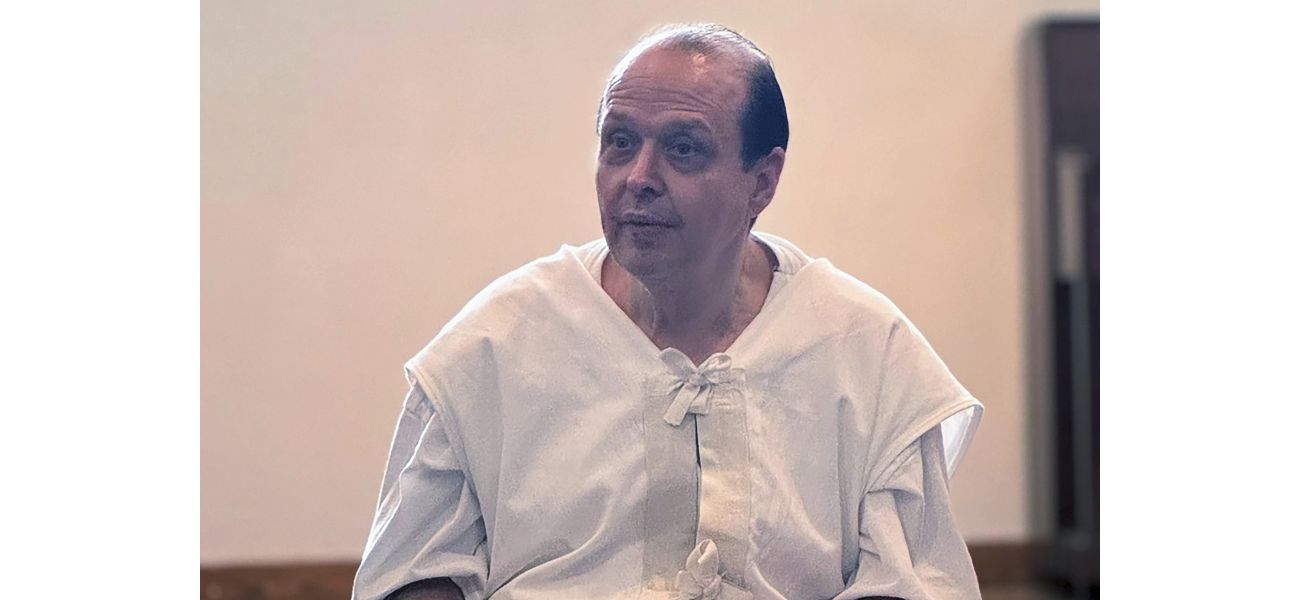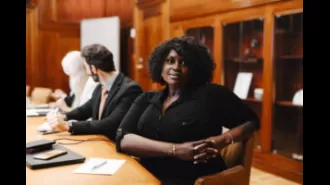Death row inmate's clemency request denied for shaken baby case.
Many people, including Republican lawmakers and a detective, are supporting Robert Roberson's innocence due to doubts about the validity of the science used in his conviction.
October 17th 2024.

A recent decision by a Texas state board has caused controversy as they have declined to intervene in what could potentially be the first execution in the United States tied to the diagnosis of shaken baby syndrome. The board rejected clemency pleas from a man named Robert Roberson, who has garnered significant support in his claims of innocence. Even Republican lawmakers and a detective involved in the case have spoken out, stating that the conviction was based on faulty science.
In a unanimous 6-0 vote, the parole board has decided not to recommend that Roberson's death sentence be commuted to life in prison or that his execution be delayed. This news comes as a major setback for efforts by Roberson's attorneys and a diverse coalition of individuals and groups who have been working tirelessly to stop his lethal injection, which is scheduled for Thursday. Despite proclaiming his innocence for many years, Roberson's options are now limited. The only remaining possibility for intervention lies with Governor Greg Abbott, who can only grant clemency after receiving a recommendation from the board.
However, Governor Abbott does have the power to grant a one-time 30-day reprieve without a board recommendation. It is worth noting that all members of the board are appointed by the governor. However, in his nearly 10 years as governor, Abbott has only halted one execution in 2018 when he spared the life of Thomas Whitaker, who had been convicted of masterminding the fatal shootings of his mother and brother. In that case, Abbott stated that he commuted the sentence in part because Whitaker's father, who had survived the shooting, feared being victimized again if his last remaining immediate family member was put to death.
Earlier today, the Texas Court of Criminal Appeals also denied another request from Roberson to stay his execution. In a last-ditch effort, Roberson's attorneys have now turned to the US Supreme Court for intervention. Roberson, now 57 years old, was sentenced to death for the 2002 killing of his two-year-old daughter, Nikki Curtis, in the city of Palestine, Texas.
One of Roberson's attorneys, Gretchen Sween, has urged Governor Abbott to grant a reprieve of 30 days to allow for further legal action. She emphasizes the overwhelming new medical and scientific evidence that shows Curtis's death was caused by natural and accidental causes, rather than abuse. However, a spokesperson for Governor Abbott has not yet responded to a request for comment on the matter.
One of the prominent figures pushing for a halt to Roberson's execution is Texas GOP megadonor and conservative activist Doug Deason. In a post on X, Deason stated that he believes Roberson is innocent. He has also been in direct communication with Governor Abbott's general counsel, James Sullivan, and two other staff members in recent weeks about Roberson's case. Meanwhile, a Texas House committee met in Austin today to discuss the case.
During the committee meeting, Brian Wharton, the lead detective on the case, expressed his remorse for playing a role in Roberson's conviction. He called on Governor Abbott to stop the execution, stating, "Don't make my mistake. Listen to Robert. Hear his voice wherever you can find him." Wharton's testimony was heard by a bipartisan group of more than 80 state lawmakers, including at least 30 Republicans, who had previously asked the board and the governor to intervene.
The scheduled execution has reignited the debate over shaken baby syndrome, which is also known in the medical community as abusive head trauma. Roberson's lawyers, along with Texas lawmakers, medical experts, and others, argue that his conviction was based on faulty and outdated scientific evidence related to shaken baby syndrome. This diagnosis refers to a serious brain injury caused by shaking or some other violent impact. However, Roberson's supporters do not deny that head injuries from child abuse are real. Instead, they argue that doctors misdiagnosed Curtis's injuries and that new evidence has shown her death was not caused by abuse, but rather by complications from severe pneumonia.
Roberson's attorneys claim that he was wrongly arrested and later convicted after taking his sick daughter to the hospital. They argue that she had fallen out of bed in Roberson's home after being ill for a week. They also point out that the only injury found on the girl's head was a minor one, which a defense expert later identified as being consistent with a short fall from a bed. Additionally, Roberson's lawyers have suggested that his autism, which was not diagnosed at the time of his daughter's death, may have been used against him as authorities became suspicious of his lack of emotion over the situation. Autism can impact communication and social interaction.
Prosecutors, however, maintain that the diagnosis of shaken baby syndrome is valid and that doctors thoroughly consider all possible factors, including any underlying illnesses, when determining the cause of a child's injuries. Anderson County District Attorney Allyson Mitchell, who prosecuted Roberson, also testified at today's committee meeting. She stated that the case was reviewed in 2022, and a judge ultimately rejected the defense's claims. Mitchell believes that the legal process has appropriate checks and balances in place to ensure that justice is served.
Since the state resumed executions in 1982, the parole board has only recommended clemency in a death row case six times. In three of those cases, the inmates were granted life in prison instead of execution. In two cases, then-Governor Rick Perry rejected the board's recommendation, and the prisoners were executed. In 2019, the board recommended a 120-day reprieve for Rodney Reed, but his execution was ultimately stayed by the Texas Court of Criminal Appeals before Governor Abbott could take any action.
Roberson's execution, if carried out, would come less than a month after Missouri executed Marcellus Williams, despite lingering doubts about his guilt. Williams was convicted of killing a social worker and former reporter in 1998. These recent cases have sparked a renewed debate over the use of shaken baby syndrome as evidence in court, and many are calling for a re-evaluation of the science behind the diagnosis.
In a unanimous 6-0 vote, the parole board has decided not to recommend that Roberson's death sentence be commuted to life in prison or that his execution be delayed. This news comes as a major setback for efforts by Roberson's attorneys and a diverse coalition of individuals and groups who have been working tirelessly to stop his lethal injection, which is scheduled for Thursday. Despite proclaiming his innocence for many years, Roberson's options are now limited. The only remaining possibility for intervention lies with Governor Greg Abbott, who can only grant clemency after receiving a recommendation from the board.
However, Governor Abbott does have the power to grant a one-time 30-day reprieve without a board recommendation. It is worth noting that all members of the board are appointed by the governor. However, in his nearly 10 years as governor, Abbott has only halted one execution in 2018 when he spared the life of Thomas Whitaker, who had been convicted of masterminding the fatal shootings of his mother and brother. In that case, Abbott stated that he commuted the sentence in part because Whitaker's father, who had survived the shooting, feared being victimized again if his last remaining immediate family member was put to death.
Earlier today, the Texas Court of Criminal Appeals also denied another request from Roberson to stay his execution. In a last-ditch effort, Roberson's attorneys have now turned to the US Supreme Court for intervention. Roberson, now 57 years old, was sentenced to death for the 2002 killing of his two-year-old daughter, Nikki Curtis, in the city of Palestine, Texas.
One of Roberson's attorneys, Gretchen Sween, has urged Governor Abbott to grant a reprieve of 30 days to allow for further legal action. She emphasizes the overwhelming new medical and scientific evidence that shows Curtis's death was caused by natural and accidental causes, rather than abuse. However, a spokesperson for Governor Abbott has not yet responded to a request for comment on the matter.
One of the prominent figures pushing for a halt to Roberson's execution is Texas GOP megadonor and conservative activist Doug Deason. In a post on X, Deason stated that he believes Roberson is innocent. He has also been in direct communication with Governor Abbott's general counsel, James Sullivan, and two other staff members in recent weeks about Roberson's case. Meanwhile, a Texas House committee met in Austin today to discuss the case.
During the committee meeting, Brian Wharton, the lead detective on the case, expressed his remorse for playing a role in Roberson's conviction. He called on Governor Abbott to stop the execution, stating, "Don't make my mistake. Listen to Robert. Hear his voice wherever you can find him." Wharton's testimony was heard by a bipartisan group of more than 80 state lawmakers, including at least 30 Republicans, who had previously asked the board and the governor to intervene.
The scheduled execution has reignited the debate over shaken baby syndrome, which is also known in the medical community as abusive head trauma. Roberson's lawyers, along with Texas lawmakers, medical experts, and others, argue that his conviction was based on faulty and outdated scientific evidence related to shaken baby syndrome. This diagnosis refers to a serious brain injury caused by shaking or some other violent impact. However, Roberson's supporters do not deny that head injuries from child abuse are real. Instead, they argue that doctors misdiagnosed Curtis's injuries and that new evidence has shown her death was not caused by abuse, but rather by complications from severe pneumonia.
Roberson's attorneys claim that he was wrongly arrested and later convicted after taking his sick daughter to the hospital. They argue that she had fallen out of bed in Roberson's home after being ill for a week. They also point out that the only injury found on the girl's head was a minor one, which a defense expert later identified as being consistent with a short fall from a bed. Additionally, Roberson's lawyers have suggested that his autism, which was not diagnosed at the time of his daughter's death, may have been used against him as authorities became suspicious of his lack of emotion over the situation. Autism can impact communication and social interaction.
Prosecutors, however, maintain that the diagnosis of shaken baby syndrome is valid and that doctors thoroughly consider all possible factors, including any underlying illnesses, when determining the cause of a child's injuries. Anderson County District Attorney Allyson Mitchell, who prosecuted Roberson, also testified at today's committee meeting. She stated that the case was reviewed in 2022, and a judge ultimately rejected the defense's claims. Mitchell believes that the legal process has appropriate checks and balances in place to ensure that justice is served.
Since the state resumed executions in 1982, the parole board has only recommended clemency in a death row case six times. In three of those cases, the inmates were granted life in prison instead of execution. In two cases, then-Governor Rick Perry rejected the board's recommendation, and the prisoners were executed. In 2019, the board recommended a 120-day reprieve for Rodney Reed, but his execution was ultimately stayed by the Texas Court of Criminal Appeals before Governor Abbott could take any action.
Roberson's execution, if carried out, would come less than a month after Missouri executed Marcellus Williams, despite lingering doubts about his guilt. Williams was convicted of killing a social worker and former reporter in 1998. These recent cases have sparked a renewed debate over the use of shaken baby syndrome as evidence in court, and many are calling for a re-evaluation of the science behind the diagnosis.
[This article has been trending online recently and has been generated with AI. Your feed is customized.]
[Generative AI is experimental.]
0
0
Submit Comment





